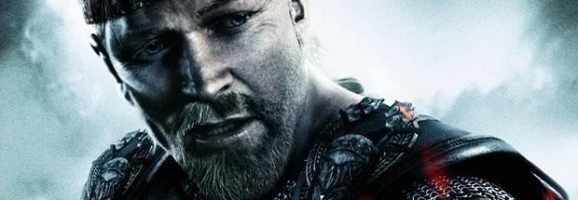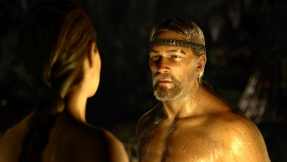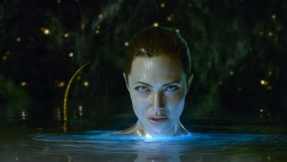Beowulf’s Transformation into an Unheroic Hero

Roger Zemeckis’ filmic reimagining of Beowulf appears to wrestle with the notion of transcribing a Medieval Anglo-Saxon piece of epic poetry onto screen for modern day audiences’ approval. What is produced by this daring feat is an interpretation that seems to combine ideas and characteristics from the Old English poem and the Norse Volsunga Saga. The pair of Medieval works are rather similar in the idea that they both concern themselves with depictions of tribal cultures, a heroic code, and the quest for eternal glory. However, the characters and the stories that Zemeckis’ combines to create his titular figure, in this case both Beowulf and Sigurd, differ substantially in their beliefs in regards to battle methods and priorities. Thus, even though Zemeckis’ hero bears the name Beowulf, the figure portrayed is a combination of two distinctly different Medieval cultures — mainly constructed through the depictions of the role of heroism, the characterization of the three monsters, and the sexualization of the female characters — which, ultimately, results in an unheroic protagonist who differs substantially from each of the original characters.

The role and nature of heroism, which was of great importance in both the poem and the Volsunga Saga, demonstrates the most dramatic transformation that takes place in Zemeckis’ adaptation from print to screen. Whilst the Beowulf in the poem illustrates ideals that are typically associated with the heroic code, such as strength, courage, and honor, the film’s version of Beowulf appears to harbor misguided values and childish weaknesses that the original could not be imagined having. This becomes readily apparent in Beowulf’s argument with Unferth in which the latter asserts that the hero’s heroic qualities are grossly exaggerated. Although the original Beowulf, in great heroic fashion, assures Unferth that the sea monsters “were washed ashore by the ocean waves, / dazed by [his] sword-blows, and … [would] never [hinder] the passage of any / sea-voyager” again (Beowulf 566-569), the film’s Beowulf is subdued by a siren-like mermaid, thus weakening his heroic attributes. The film’s Beowulf, however, does not inform his audience that the incident took place, therefore making Unferth’s accusations of Beowulf’s deceit not all that erroneous.
Beowulf’s fight with Grendel in the film illuminates the Sigurd-like attributes that have been placed onto the prior’s character. One of the main differences between the characters of Beowulf and Sigurd are their methods of combat. While the poem’s Beowulf vows to have a “war without weapons” (Beowulf 685) with Grendel, Sigurd proudly wields his sword during battle, prominently shown when he “drew the sword Gram and cut off Regin’s head” (Saga of the Volsungs 66). Zemeckis’ Beowulf, while still declaring that he will not use any weapons, fails to capture Grendel with just his own hands; rather, he must use Heorot’s chains and door to sever the monster’s arm. Although the heroic qualities of the film’s protagonist are not downgraded simply because they use objects other than their physical bodies to defeat enemies, this change in Beowulf’s methods of destruction does lessen the heroic greatness of the Old English hero. Furthermore, Beowulf’s appearance in the film can be directly related to Sigurd’s physical description. The detail and importance given to Sigurd’s appearance is immense when compared to the original Beowulf, who remains relatively uncharacterized. Yet, like Sigurd’s “broad, chiseled face” and “body [that] was well proportioned in height and size and in all respects most becoming,” (Saga of the Volsungs 72) the film places significant attention towards Beowulf’s body, which he proudly displays while fighting Grendel completely nude. This depiction of the warrior’s physical appearance, his intense sexualization, and the numerous phallic jokes associated with him during his nude scenes, like the methods that he used in killing Grendel, substantially lowers the heroic quality of Beowulf’s character, resulting in a more unheroic figure.
The discussion towards the heroic portrayal of Beowulf thus leads into the depiction of the three monsters, where, in the original poem, Beowulf gains eternal glory and fame. The monsters of the film are significantly different from those in the epic poem, and therefore vastly change the value of Beowulf’s conquering of them. Rather than being decedents of Cain who are personally insulted because of Heorot’s Christian concert telling of how “the Almighty created the earth,” (Beowulf 93) Zemeckis’ monsters are simply angered because the Heorot merrymaking is too loud, thus hurting Grendel’s sensitive ears. This change in characterization produces monsters who are significantly less evil. They are no longer internally demonic forces who threaten the Christian spirit, and, therefore, Beowulf’s defeat of Grendel in particular is seen as less heroic and almost savage. There is a newly found sympathy for Grendel’s mother while she mourns the loss of her child. Continuing, Grendel and the Fafnir-like Dragon further the notion of Beowulf and even the entire society being flawed. If, in the original poem, the monsters come to represent Beowulf and other’s internal flaws such as greed and envy, then the film’s depiction of the monsters as offspring of the Anglo-Saxon kings only enlarges these internal inadequacies. While the film’s Beowulf may come to recognize his flaws as the movie progresses, his Fafnir-like son, who looks strikingly similar to a young Beowulf, ultimately leads to his downfall. Therefore, this symbolic representation demonstrates Beowulf’s self-inflicted demise, and, like Hrothgar, his heroic qualities are vastly diminished into the realm of the unheroic.

Grendel’s Mother experiences the most drastic transformation from the poem to film. While the poem characterizes her as a gruesome “she-wolf” and “water witch,” (Beowulf 1506, 1518) she appears in the film as a beautiful woman whose only animalistic quality is a serpent-like tail. Grendel’s Mother’s filmic portrayal is that of a seductress, an individual who is able to manipulatively seduce Beowulf, Hrothgar, and eventually Wiglaf (if one views the end in that fashion). Although Beowulf can successfully defeat sea demons, Grendel, and the Dragon, he is unable to defend himself against his own lustful desires. The poem’s Beowulf was exceptionally desexualized and focused his attention instead on the heroic code of pride and courage. The film’s Beowulf, however, appears to have received some of Sigurd’s characteristics, who has no difficulty expressing his love for women. Nevertheless, Beowulf’s susceptibility to Grendel’s Mother’s promiscuousness ultimately leads to his downfall in death, in which she still lives on, resulting in a dramatically different defeat for Beowulf.
Lastly, the role of female characters in the film, specifically their intense sexualization, continues the transformation of the Beowulf character into an unheroic being. In the original poem, women predominately play the role of the peacekeepers and are thus desexualized. The females in the film, however, are all sexualized in one way or another. This sexualization correlates to the females in the Saga of the Volsungs; while the females encompassing Sigurd are not as overtly sexualized as Grendel’s Mother, Brynhild and Gudrun nonetheless appear to be remarkably similar to Wealhtheow and Ursula, respectively, as the film’s Beowulf’s wanting of the queen near the beginning of the film and his taking of a mistress at the end mirrors Sigurd’s relationship with his two respective women. Furthermore, other characteristics from the Norse women seem to trespass into Beowulf. Grendel’s Mother could been seen as a mixture between Grimhild and Brynhild; she tricks Beowulf into desire just as Grimhild does Sigurd, and Brynhild’s warrior-like abilities, along with the fact that she plans Sigurd’s death, mirrors Grendel’s Mother. While the agency — if it could be called that — given to the females in the film that is similar to those involved with Sigurd is not necessarily a negative impact, the idea of the female characters acting as agents of love, instead of peacekeepers, ultimately leads the film’s Beowulf into his unheroic state, as his desires for the women force him to stray from his original heroic priorities.
The transformation Beowulf receives through his adaption from page to screen is remarkably telling in regards to his role as a heroic hero. Zemeckis’ meshing of the two completely separate Medieval works of Beowulf and the Volsunga Saga results in a titular character who, while containing qualities of both, is staunchly different from either. Through the depictions of the nature of heroism, the role of the three monsters, and the characterization of the female characters, the filmic Beowulf essentially falls from grace, and ultimately becomes a character who is unlike both Sigurd and the original Beowulf: an unheroic figure.
Works Cited
Beowulf. Dir. Robert Zemeckis. Perf. Ray Winstone, Anthony Hopkins, and Angelina Jolie. Paramount Pictures, 2007. Netflix.
Byock, Jesse L., trans. The Saga of the Volsungs. London: Penguin, 1999. Print. Penguin Classics.
Liuzza, R. M., trans. Beowulf. 2nd ed. Buffalo: Broadview, 2013. Print. Broadview Editions.
What do you think? Leave a comment.











I love your in-depth analysis of a great film. I have never been a big fan of the Robert Zemickis’s motion capture movies, But Beowulf is one of his best. It not everyday you see an animated film( or in this case motion capture) made for mature audiences.
Terry glad to see this published. Love Beowulf, good job with the article. On a side note, I saw a license plate that had Beowulf; I was wondering if it was an English teacher:)
Awesome article, loved the depth of knowledge and personality throughout. It’s a fantastic tale. Glad to see so many people still enjoying and learning from it.
Cool subject approached with expertise. Love the idea of analyzing the hero by looking at the type of monsters he’s facing. Good article!
Ray Winstone did a nice job in this picture as our hero.
Let’s face it, put Beowulf, one of the greatest classical poems, and Robert Zemickis, the man who brought us Back To The Future and The Polar Express, together, and you should have a darn fine film.
The dialog is so stiff. The movie needs an antagonist more compelling than a muscle bound screaming hero.
Better film adaptations are the also unconventional but basically honorable efforts of BEOWULF AND GRENDEL starring Gerard Butler and THE 13TH WARRIOR featuring Antonio Banderas. As for this film, it is an unreserved failure, save perhaps as a parody of the great work from which it is spawned.
it simply isn’t BEOWULF.
Great analysis! I now understand why the movie was so…different and why it received a lot of bback-lash.
I’m actually happy that Beowulf passed my expectations. It answered concerns over expanding the story and the idea of Ray Winstone as the man exceptionally.
Started watching this movie again last night. Got as far as ‘Beowulf’s’ line: ‘I will kill your monster!’
The concept of a imperfect hero is refreshing and “new” and i enjoyed the movie despite the imperfections and lack of coherence
At first I didn’t like this movie at all. I thought the animation was a dreadful idea. What is the point in animating perfectly good actors and actresses when special effects nowadays allow you to have great visuals but still have people looking like real people?
The plot is incomplete and vague. In the whole film i never realized what was all about.
I studied the poem Beowulf at university and I’m familiar with the story, so I noticed where the movie deviated significantly from the plot.
This was absolutely the worst adaptation of any story ever in the history of man.
I actually preferred the plot of the movie, because it brings an additional tragic element into the tale and makes Beowulf seem that bit more human. I honestly don’t think the Anglo-Saxons would have minded. In fact, I think they would have relished the relentless focus on action, heroic deeds, mead halls and wenches that fills the movie from start to finish.
Started watching this movie again last night. Got as far as ‘Beowulf’s’ line: ‘I will kill your monster!’
I was unfamiliar with the Volsunga saga. This addition might explain why the film seemed to vary a bit from Beowulf.
I actually took a course in English lit that included Beowulf in the assigned readings. I did, however, read the saga before that course, and watched the animation before doing any of the readings. My love for both works didn’t decline, even after I watched the ‘unheroic’ Beowulf version.
You made some good points, but personally I think that Zemeckis simply tried to produce a movie that will apply to the present day audience. He could have easily made a movie based entirely on the original saga but that would have been a bit irrelevant and boring due to the following facts:
1) When Beowulf was first told its role was that of a Christian parable mixed with Pagan traditions and rituals. The values that the story tried to embed served the desire of the authorities to uproot paganism and replace it with Christian values.
2) Audiences today need some dramatic relationships intertwined with the plot, otherwise it’ll be plain boring.
3) Beowulf is grossly unrealistic… Zemeckis actually improved the narrative by adding elements of realism to it.
Sure, the ‘new’ Beo might seem like a pansy compared to the stoic and untouchable original, but he is also a by far more interesting and believable persona as a result.
This is fantastic. Hollywood has a way of packaging things together in hopes that nobody will actually do the deep thinking to figure out what is going on. This is an amazing analysis of not just the movies but also the two works that were used as source material